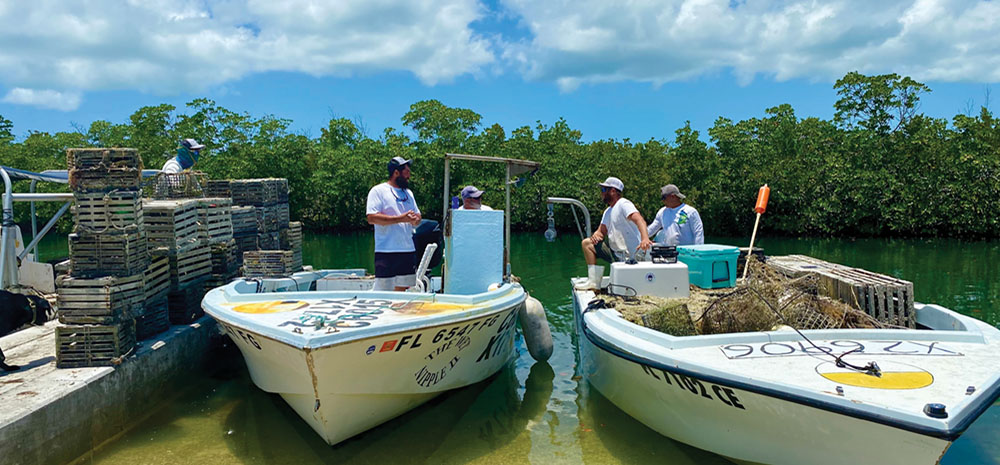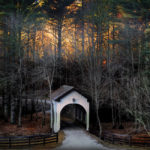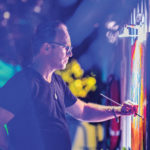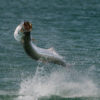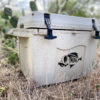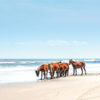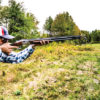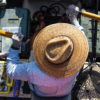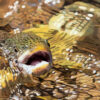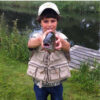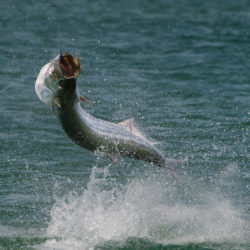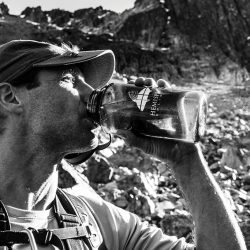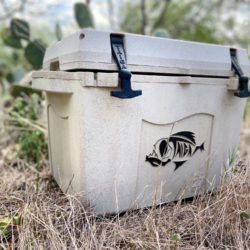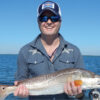It all started, as so many good things do, with a day at the beach.
Neill (“Captain Neill”) Holland and his partner Danielle Dawley had recently relocated to St. Petersburg, Florida, from New York to be near the ocean environment they both loved. One day they headed to the waterfront, and Danielle began gathering trash in a grocery store bag, filling it quickly with plastics and wrappers and anything else she could find. She had a lifelong passion for nature born and cultivated by a childhood and young adulthood spent around the globe as the daughter of an SAS flight attendant.
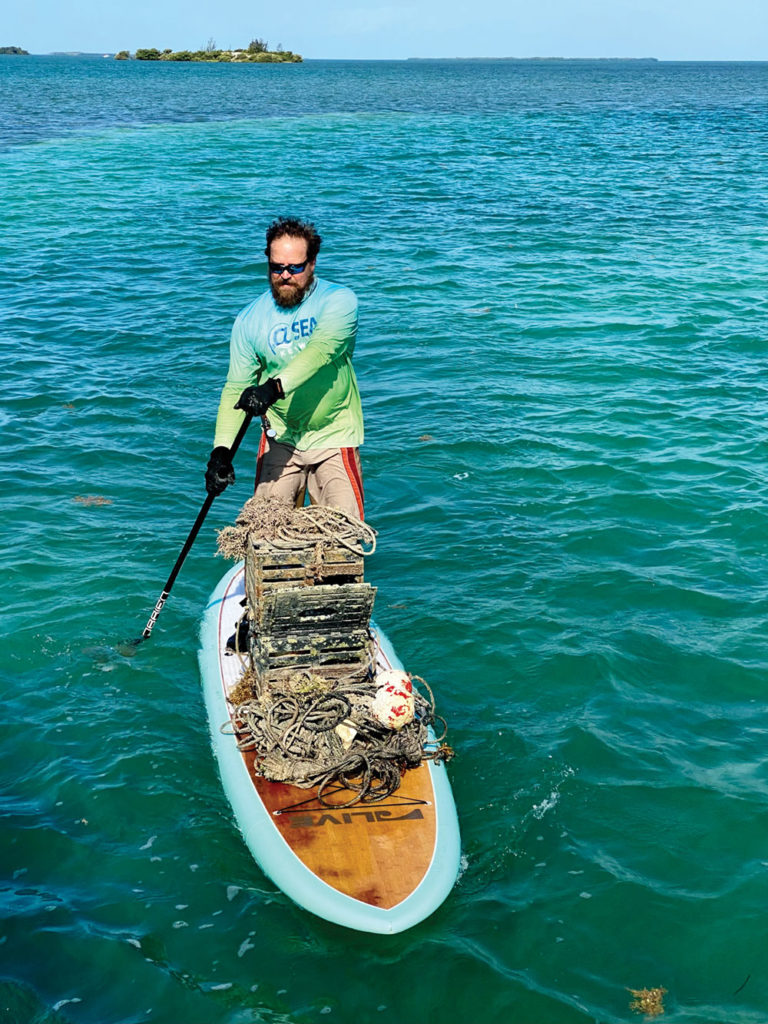
“It just started a conversation about whether it might be possible to gather more volunteers and get more hands-on with this work she was so passionate about, and that I became so passionate about through her,” said Captain Neill, who was in the process of renewing his charter captain’s license, and would later start a commercial charter operation out of Tampa Bay. Their shoreline explorations expanded to the water, where they would go boating around the Tampa Bay watershed and began to notice “ghost gear,” or lost and abandoned crab traps.
“We thought it was really just a debris issue,” he said, “something that was degrading in the environment and could cause problems down the road.”
What they didn’t know then was the very real threat these traps caused to marine life, and, by extension, to the economic well-being of the region.
“Oftentimes you see these from the boat, and you see these traps sitting in three feet of water,” Captain Neill explained, “and you don’t understand that it probably has all kinds of marine life stuck inside of it that cannot escape.”
Further complicating matters is the fact that the lobster traps are made of wood and concrete, biodegradable materials. They might continue to trap crab, lobster, fin fish and other species for three-to-five years. The stone crab traps, however, are made of a reinforced plastic similar to, but stronger than, a milk crate, and last much longer in the water.
The road from idea to reality took a couple of years, helped greatly by Captain Neill’s years of experience managing millions of dollars in grant money allocations to major nonprofit organizations. By 2017, Ocean Aid 360 made its debut as a 501c3 nonprofit—an all-hands-on-deck grassroots organization that brings recreational anglers/divers, sportfishing captains and commercial fishermen together for the common good of protecting coastal waters
The first thing Captain Neill and Dawley did was to visit Grants.gov, the federal grants registry website, where they learned that they were hardly alone in their concerns. The National Oceanic and Atmospheric Administration (NOAA) had a grant solicitation specifically aimed at marine debris removal with a high priority on derelict fishing gear. The couple secured the grant, and by mid 2018 they were off to the races.
Or, better yet, to the rodeo.
Their initial grant-earning concept was a “Ghost Trap Rodeo,” an event that would bring amateur anglers, volunteers and commercial fishermen together for a fishing tournament where the intended haul was not marine life, but ghost traps.
The pair began their efforts in the Tampa Bay watershed, where they quickly gained the attention of some of the state’s most influential environmental organizations and leaders. The concept, Dawley said, was simple. “The idea was to do a tournament-style event that fishermen, people in the water and anglers are used to, and then offering prizes as incentives to volunteer their time and their vessels.” They launched the event in 2018, and held one every six weeks or so, before NOAA and Florida’s Fish and Wildlife Conservation Commission (FWC) suggested they might think about expanding the effort outside of the Tampa-St. Pete region.
In late 2020, another landmark moment came when Captain Neill and Dawley received a call from the Grassy Creek Foundation (GCF). GCF is a private family foundation founded by Chad and Blake Pike. Chad Pike is also the founder of Eleven Experience, which strives to set a new standard in experiential travel by providing clients with unprecedented adventures and authentic connections, combining its global array of premier, off-the-grid properties with a collection of world-class guides.
Both organizations share a deep commitment to environmental conservation and responsible stewardship of natural resources. GCF focuses on causes that allow it to work with partners on projects that, in the words of Pike, “can really move the needle.” Past partners have included the North Atlantic Salmon Fund, the Rocky Mountain Biological Laboratory and the Bonefish and Tarpon Trust, among others. “We look for projects where GCF’s support will have the largest impact,” Pike recently told thewadinglist.com. “The goal is to foster a multiplier effect with respect to impact so that we are not just fixing one mile at a time.”
One day while fishing with a trusted guide, Todd ‘Otis’ Burbridge, Pike noted the prevalence of marine debris in the waters around them. He and Burbridge also discussed Covid 19’s impact on tourism, leading to an idea that could help both the environment and the economic fortunes of a population hard-hit by the pandemic. “We had been hearing so much about the devastating effect the pandemic was having on the angling community, and particularly on guides,” Pike said. “You’ve got out-of-work anglers with boats and a lot of marine debris. What if we give guides a day’s wage to spend time on water removing that debris?”
Ocean Aid 360 jumped at the chance to test out this new twist to their model. The first GCF funded event was held in Key West on February 22-24, and it featured prizes donated by Eleven Experience as well as by CCA Florida Boaters Republic, Engle Cooler and Power Pole. The partnership was a winner from the start for both sides, bringing ashore nearly 12,000 pounds of debris and employing the skills (and boats) of six captains. The event was slightly complicated by the fact that it was held during the trap fishing season, meaning that Ocean Aid 360 staff had to carefully train each participant to discern between active and abandoned traps. They set their sights on a second, larger summer event, in the off-season for trap fishing in the area. At that point, all observed traps in these fisheries are recognized as discarded, making them all fair game for the participants.
Last Memorial Day, 14 captains gathered for a three-day Ghost Trap rodeo in Key West, loading their shallow-draft commercial boats with gear and eager volunteers, including Brian O’Keefe, angling product manager for Eleven Experience. O’Keefe quickly noted the spirit of camaraderie. “There was a lot of good natured ribbing between captains as we were loading up and it was very clear that everyone was excited about the opportunity to be out on the water having fun and making a real difference.”
It wasn’t long before the hard work began, and O’Keefe was right in the middle of it all, making fast friends with his fellow partners in grime, including local captain Jeremy Loercher, and OA360 core staffer Adam Welch. “It was good physical fun,” he said, “and a great bonding experience because you meet total strangers at the dock, and by the time you get back to the dock, you have these new buddies. One of the great things was that there was absolutely no hierarchy out there. Everyone was working for the same thing.”
While Captain Neill oversaw things from the water, Dawley served as land captain, making sure her team, including OA360’s Amy Losoya, Lauren Campbell and representatives from the Key West nonprofit organization Reef Relief, was ready when the haul began coming in. It didn’t take long for her to realize that they were in trouble. The best kind of trouble. “When they started bringing traps in,” Dawley said, “we were fish out of water there for a minute. We absolutely could not believe how much they were bringing in. We filled an entire parking lot with the heavy lobster traps that are between 75 and 100 pounds each, and stone crab traps, which weighed up to 45 pounds and have concrete bases. It was pretty clear there was going to be some serious heavy lifting going on.”
The “trouble” never stopped. Soon the parking lot was full of traps, and executive decisions were made to make a preliminary run to dispose of them before more came in. And boy did they come in.
By the end of the day, the haul had removed 10 tons of debris, nearly exceeding the three-day goal for the event. Two days later, the effort had brought in 822 traps and an astonishing 40,000 pounds of debris in all. The impressive numbers don’t stop there. Captain Neill reports that each trap averaged three animals, with more than 1,000 in all live-released over the three days.
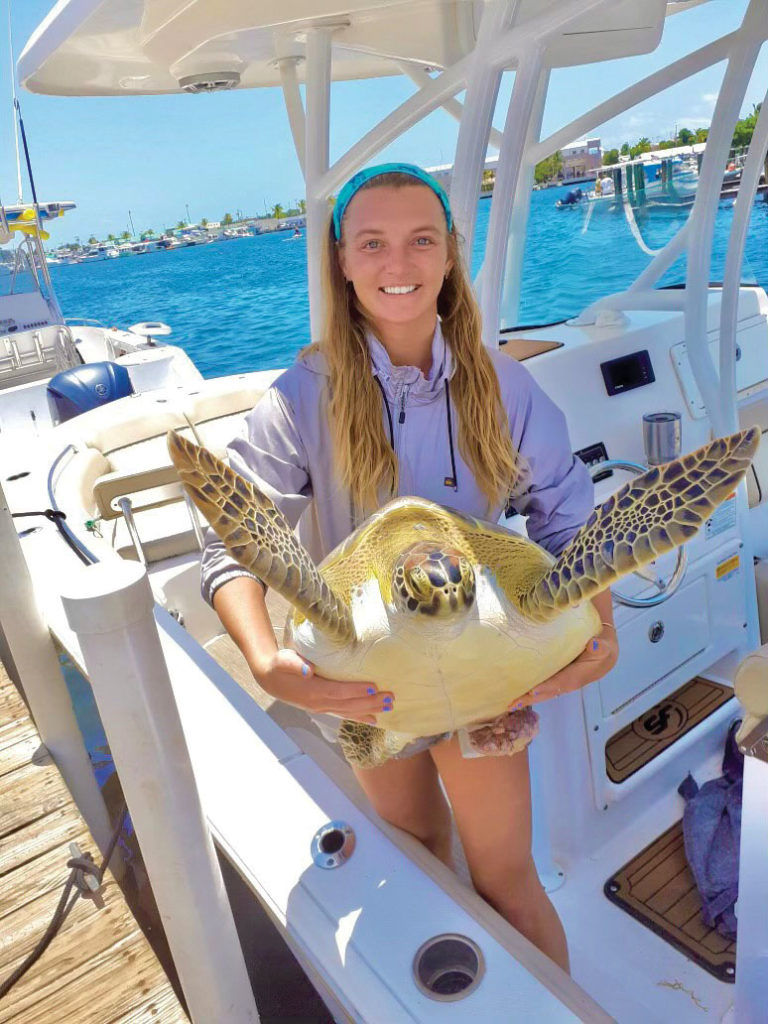
These numbers included one very special find. “We got a call from one of our staffers that one boat had found a turtle that had become ensnared in ropes that were connected to a trap,” Dawley said. “We called FWC and they asked us to bring it ashore. They washed up with a turtle ambulance that transported it to a turtle hospital in Marathon.” The team named their new friend “Trapper,” and Dawley was happy to report that Trapper is very much on the mend and will soon be released back into open waters.
Of course, the results of an event like this go beyond numbers. One of the participating captains, Mimi Stafford, came back on one of the days exclaiming, “I don’t think I’ve ever seen these waters so clean!” Stafford’s words take on more meaning when you consider she has been fishing the area commercially since the 1970’s.
“We have many grantees with very ambitious missions and objectives that can take years to realize,” said GCF Executive Director Kateryna Rakowsky, who spent a decade as a lawyer before taking her talents to the nonprofit world and focusing on conservation. “By contrast, the impact of this three-day event was immediately visible and far exceeded everyone’s expectations. Ocean Aid 360 pulled together a phenomenal clean up and we were thrilled with the outcome.”
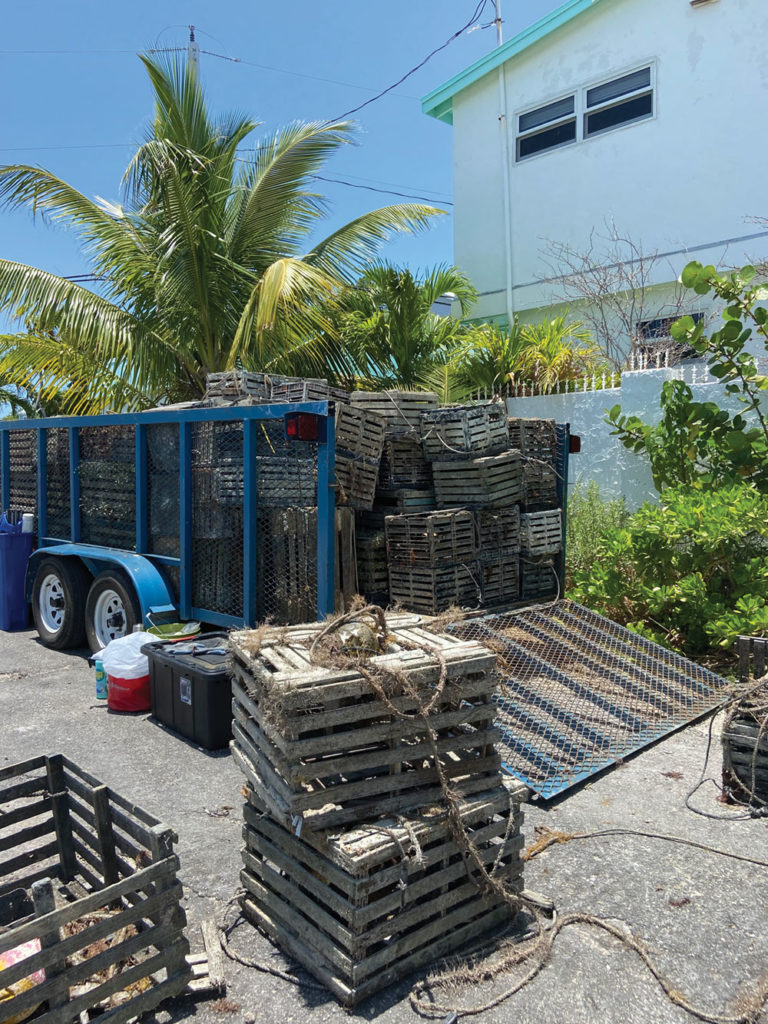
O’Keefe agreed that seeing the tangible results of his and his new friends’ efforts was incredibly rewarding. “It is so different from writing a check or signing a petition. There is nothing like that human element of working together to do this muddy, gritty job and then seeing the results of our efforts right in front of us—dumpsters and dumpsters and trailers and trailers loaded to the brim with literally tons of stuff.”
Not all of this “stuff” was beyond repair. Approximately 20% of the traps brought in during the event were in good working condition, O’Keefe said, meaning they could have been trapping and killing marine life for years to come. Ocean Aid 360 is currently talking to the FWC about instituting a buy-back program for working traps, according to Dawley, allowing them to be re-purposed while at the same time providing an incentive for the captains to collect them.
“I think people feel activated,” Captain Neill said. “They are clearly delighted that they have been impactful in such a positive way for our watershed.” These include some participants who are trepidatious at first, he said. “I love the fact that some people, commercial or not, might show up to one of our events thinking, ‘Are these people going to be some kind of eco warriors?’ The truth is, we are eco warriors, but we are also anglers. I have a commercial charter company out of Tampa Bay, and we have a lot of relationships with commercial operators, so this is something that takes a balanced and inclusive approach and doesn’t demonize anybody. We just want to help in any way we can to make a positive impact.”
For more information on Ghost Trap Rodeos and Ocean Aid 360, visit www.oceanaid360.org. Learn more about Eleven Experience at www.elevenexperience.com.
John Kelly is a contributing editor of The Virginia Sportsman. He is a writer and public-relations professional based in Charlottesville, Virginia, whose work has appeared in the UVA Arts Magazine, Albemarle Magazine and USA Today, among other publications. Kelly also works regularly throughout Central Virginia as a singer-songwriter and recently released an album of original songs titled “In Between.”
Cover photo: Participants compare notes while making drop-offs at the Key West Ghost Trap Rodeo. Photo by Alex Fenlon

